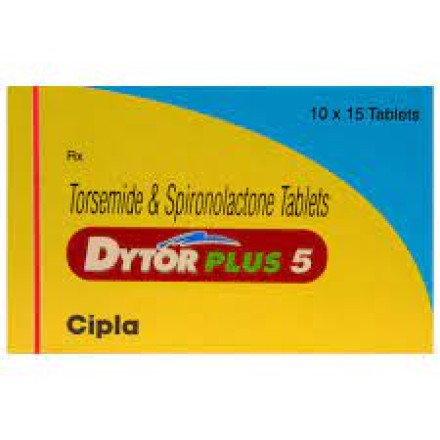-
Retorlix SP 50mg/5mg Tablet (Rs.22.5)
Composition: Spironolactone (50mg) + Torasemide (5mg)
-
Torecure Plus 50mg/5mg Tablet (Rs.154.69)
Composition: Spironolactone (50mg) + Torasemide (5mg)
-
Eriloop-Plus 5 Tablet (Rs.76.88)
Composition: Spironolactone (50mg) + Torasemide (5mg)
-
Texlon Plus 50mg/5mg Tablet (Rs.55.55)
Composition: Spironolactone (50mg) + Torasemide (5mg)
-
Torawin Plus 50mg/5mg Tablet (Rs.65.34)
Composition: Spironolactone (50mg) + Torasemide (5mg)
-
Torsalive-Plus 5 Tablet (Rs.55.31)
Composition: Spironolactone (50mg) + Torasemide (5mg)
-
Tordema 5 Plus Tablet (Rs.84.38)
Composition: Spironolactone (50mg) + Torasemide (5mg)
-
Torwill Plus 5 Tablet (Rs.45)
Composition: Spironolactone (50mg) + Torasemide (5mg)
-
Saplac T 50mg/5mg Tablet (Rs.68.91)
Composition: Spironolactone (50mg) + Torasemide (5mg)
-
Loopstar Plus 50mg/5mg Tablet (Rs.37.13)
Composition: Spironolactone (50mg) + Torasemide (5mg)
All Details About Dytor Plus 5 Tablet
Find out detailed description, uses, directions of use, side effects, warnings and precautions, frequently asked questions about Dytor Plus 5 Tablet
Description:
Dytor Plus 5 Tablet is used to treat edema (swelling) caused by conditions such as heart failure, liver disease, kidney disease, or pulmonary edema. It helps the body eliminate excess fluid. It is also used to treat high blood pressure, helping to lower strain on the heart and improve overall circulation.Dytor Plus 5 Tablet is best taken in the morning along with food to avoid frequent urination at night. For better results, it is suggested that you take it at the same time every day. The dose and how often you take it depend on what you are taking it for. Your doctor will decide how much you need to improve your symptoms. You should take this medicine for as long as it is prescribed for you.
Ordinary side effects of Dytor Plus 5 Tablet include dizziness, frequent urination, headache, diarrhea, and period pain. If any of these side effects persist or worsen, let your doctor know. They may be able to suggest ways to manage or treat them.
Earlier taking this medicine, tell your doctor if you have any liver or kidney disease. Tell your doctor if you are pregnant or breastfeeding. You should also let your doctor know all other medicines you are taking, as they may affect, or be affected by, this medicine.
Directions For Use:
Take this medicine in the dose and duration as advised by your doctor. Swallow it as a whole. Do not chew, crush or break it. Dytor Plus 5 Tablet is to be taken with food.Side Effects:
Most side effects do not require any medical attention and disappear as your body adjusts to the medicine. Consult your doctor if they persist or if you’re worried about themOrdinary side effects of Dytor Plus
- Frequent urge to urinate
- Headache
- Inflammation of the nose
- Muscle pain
- Dizziness
- Abnormal ECG
- Gastrointestinal disturbance
- Increased liver enzymes
- Diarrhea
- Memory impairment
- Pain during periods
Warning & Precautions:
Employ of Dytor Plus 5 Tablet is not recommended in patients with severe kidney disease.
FAQs:
What is Dytor Plus 5 Tablet?
Is it safe to use Dytor Plus 5 Tablet?
Can the use of Dytor Plus 5 Tablet cause dizziness?
Can the use of Dytor Plus 5 Tablet cause dehydration (excessive loss of fluid)?
Can the use of Dytor Plus 5 Tablet cause hyperkalemia (increased potassium levels)?
What are the contraindications to the use of Dytor Plus 5 Tablet?
What is the storage condition for the Dytor Plus 5 Tablet?
Written by:
Dr. T. Sharmila Krishna
M.B.B.S., MD (Biochemistry)
Reviewed by:
Dr. Sureshbabu Yadav
M.B.B.S., DIP.DIAB, F.R.S.H
Disclaimer:
Getomeds primary intention is to ensure that its consumers get information that is reviewed by experts, accurate, and trustworthy. The information and contents of this website are for informational purposes only. They are not intended to be a substitute for professional medical advice, diagnosis, or treatment. Please seek the advice of your doctor and discuss all of your concerns about any disease or medication. Do not disregard or postpone seeking professional medical advice because of something you read on Getomeds. Our mission is to support, not replace, the doctor-patient relationship.
